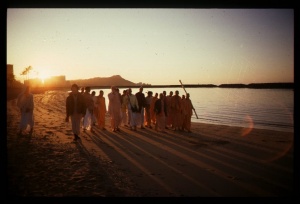SB 10.63.6: Difference between revisions
m (1 revision(s)) |
No edit summary |
||
| Line 1: | Line 1: | ||
{{info | {{info | ||
|speaker= | |speaker=Śukadeva Gosvāmī | ||
|listener=King | |listener=King Parīkṣit | ||
}} | }} | ||
[[Category:Srimad-Bhagavatam - Canto 10 Chapter 63|s06]] | |||
[[Category:Bhagavatam Verses Spoken by Sukadeva Gosvami - Vanisource|106306]] | |||
<div style="float:left">'''[[Srimad-Bhagavatam]] - [[SB 10|Tenth Canto]] - [[SB 10.63: Lord Krsna Fights with Banasura|Chapter 63: Lord Kṛṣṇa Fights with Bāṇāsura]]'''</div> | |||
<div style="float:right">[[File:Go-previous.png|link=SB 10.63.5]] '''[[SB 10.63.5]] - [[SB 10.63.7]]''' [[File:Go-next.png|link=SB 10.63.7]]</div> | |||
{{RandomImage}} | |||
{{SBnotice}} | |||
==== TEXT 6 ==== | ==== TEXT 6 ==== | ||
<div | <div class="verse"> | ||
bāṇārthe bhagavān rudraḥ | :bāṇārthe bhagavān rudraḥ | ||
sa-sutaḥ pramathair vṛtaḥ | :sa-sutaḥ pramathair vṛtaḥ | ||
āruhya nandi-vṛṣabhaṁ | :āruhya nandi-vṛṣabhaṁ | ||
yuyudhe rāma-kṛṣṇayoḥ | :yuyudhe rāma-kṛṣṇayoḥ | ||
</div> | </div> | ||
| Line 17: | Line 22: | ||
==== SYNONYMS ==== | ==== SYNONYMS ==== | ||
<div | <div class="synonyms"> | ||
bāṇa- | ''bāṇa-arthe''—for Bāṇa's sake; ''bhagavān rudraḥ''—Lord Śiva; ''sa-sutaḥ''—together with his son (Kārtikeya, the general of the demigods' army); ''pramathaiḥ''—by the Pramathas (mystic sages who always attend Lord Śiva, appearing in a multitude of forms); ''vṛtaḥ''—accompanied; ''āruhya''—riding; ''nandi''—on Nandi; ''vṛṣabham''—his bull; ''yuyudhe''—he fought; ''rāma-kṛṣṇayoḥ''—with Balarāma and Kṛṣṇa. | ||
</div> | </div> | ||
{{SBcollapse}} | |||
==== TRANSLATION ==== | ==== TRANSLATION ==== | ||
<div | <div class="translation"> | ||
Lord Rudra, accompanied by his son Kārtikeya and the Pramathas, came riding on Nandi, his bull carrier, to fight Balarāma and Kṛṣṇa on Bāṇa's behalf. | Lord Rudra, accompanied by his son Kārtikeya and the Pramathas, came riding on Nandi, his bull carrier, to fight Balarāma and Kṛṣṇa on Bāṇa's behalf. | ||
</div> | </div> | ||
| Line 31: | Line 36: | ||
==== PURPORT ==== | ==== PURPORT ==== | ||
<div | <div class="purport"> | ||
Śrīla Śrīdhara Svāmī states that the word bhagavān is used here to indicate that Lord Śiva is by nature all-knowing and thus well aware of Lord Kṛṣṇa's greatness. Still, although Śiva knew Lord Kṛṣṇa would defeat him, he joined the battle against Him to demonstrate the glories of the Supreme Personality of Godhead. Śrīla Viśvanātha Cakravartī Ṭhākura states that Lord Śiva entered the battle for two reasons: first, to increase Lord Kṛṣṇa's pleasure and enthusiasm; and second, to demonstrate that the Lord's incarnation as Kṛṣṇa, although enacting humanlike pastimes, is superior to other avatāras, such as Lord Rāmacandra. Śrīla Viśvanātha Cakravartī further states in this regard that Yogamāyā, Lord Kṛṣṇa's internal potency, bewildered Lord Śiva just as she had bewildered Brahmā. In support of this statement, the ācārya cites the phrase brahma-rudrādi-mohanam from Bhakti-rasāmṛta-sindhu. Of course, Yogamāyā's job is to make fine arrangements for the Lord's pastimes, and thus Śiva became enthusiastic to battle the Supreme Lord, Kṛṣṇa. | Śrīla Śrīdhara Svāmī states that the word ''bhagavān'' is used here to indicate that Lord Śiva is by nature all-knowing and thus well aware of Lord Kṛṣṇa's greatness. Still, although Śiva knew Lord Kṛṣṇa would defeat him, he joined the battle against Him to demonstrate the glories of the Supreme Personality of Godhead. Śrīla Viśvanātha Cakravartī Ṭhākura states that Lord Śiva entered the battle for two reasons: first, to increase Lord Kṛṣṇa's pleasure and enthusiasm; and second, to demonstrate that the Lord's incarnation as Kṛṣṇa, although enacting humanlike pastimes, is superior to other ''avatāras'', such as Lord Rāmacandra. Śrīla Viśvanātha Cakravartī further states in this regard that Yogamāyā, Lord Kṛṣṇa's internal potency, bewildered Lord Śiva just as she had bewildered Brahmā. In support of this statement, the ''ācārya'' cites the phrase ''brahma-rudrādi-mohanam'' from ''Bhakti-rasāmṛta-sindhu''. Of course, Yogamāyā's job is to make fine arrangements for the Lord's pastimes, and thus Śiva became enthusiastic to battle the Supreme Lord, Kṛṣṇa. | ||
</div> | </div> | ||
__NOTOC__ | </div> | ||
</div> | |||
<div style="float:right">[[File:Go-previous.png|link=SB 10.63.5]] '''[[SB 10.63.5]] - [[SB 10.63.7]]''' [[File:Go-next.png|link=SB 10.63.7]]</div> | |||
__NOTOC__ | |||
__NOEDITSECTION__ | |||
Revision as of 04:43, 25 May 2021

A.C. Bhaktivedanta Swami Prabhupada
Please note: The synonyms, translation and purport of this verse were composed by disciples of Śrīla Prabhupāda
TEXT 6
- bāṇārthe bhagavān rudraḥ
- sa-sutaḥ pramathair vṛtaḥ
- āruhya nandi-vṛṣabhaṁ
- yuyudhe rāma-kṛṣṇayoḥ
SYNONYMS
bāṇa-arthe—for Bāṇa's sake; bhagavān rudraḥ—Lord Śiva; sa-sutaḥ—together with his son (Kārtikeya, the general of the demigods' army); pramathaiḥ—by the Pramathas (mystic sages who always attend Lord Śiva, appearing in a multitude of forms); vṛtaḥ—accompanied; āruhya—riding; nandi—on Nandi; vṛṣabham—his bull; yuyudhe—he fought; rāma-kṛṣṇayoḥ—with Balarāma and Kṛṣṇa.
Translation and purport composed by disciples of Śrīla Prabhupāda
TRANSLATION
Lord Rudra, accompanied by his son Kārtikeya and the Pramathas, came riding on Nandi, his bull carrier, to fight Balarāma and Kṛṣṇa on Bāṇa's behalf.
PURPORT
Śrīla Śrīdhara Svāmī states that the word bhagavān is used here to indicate that Lord Śiva is by nature all-knowing and thus well aware of Lord Kṛṣṇa's greatness. Still, although Śiva knew Lord Kṛṣṇa would defeat him, he joined the battle against Him to demonstrate the glories of the Supreme Personality of Godhead. Śrīla Viśvanātha Cakravartī Ṭhākura states that Lord Śiva entered the battle for two reasons: first, to increase Lord Kṛṣṇa's pleasure and enthusiasm; and second, to demonstrate that the Lord's incarnation as Kṛṣṇa, although enacting humanlike pastimes, is superior to other avatāras, such as Lord Rāmacandra. Śrīla Viśvanātha Cakravartī further states in this regard that Yogamāyā, Lord Kṛṣṇa's internal potency, bewildered Lord Śiva just as she had bewildered Brahmā. In support of this statement, the ācārya cites the phrase brahma-rudrādi-mohanam from Bhakti-rasāmṛta-sindhu. Of course, Yogamāyā's job is to make fine arrangements for the Lord's pastimes, and thus Śiva became enthusiastic to battle the Supreme Lord, Kṛṣṇa.